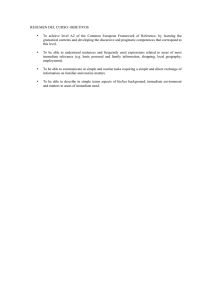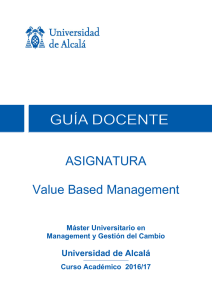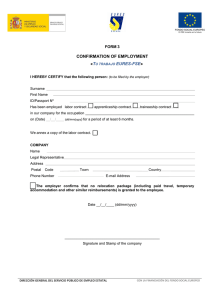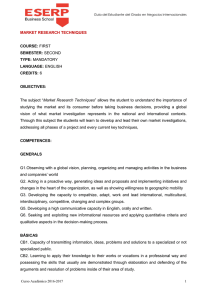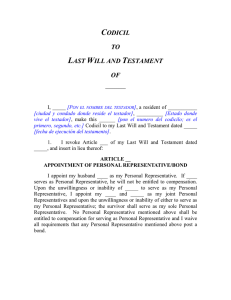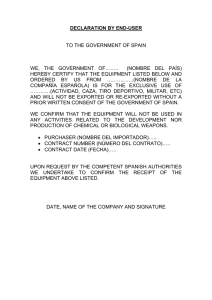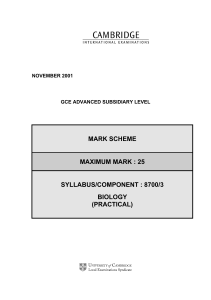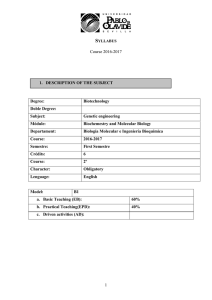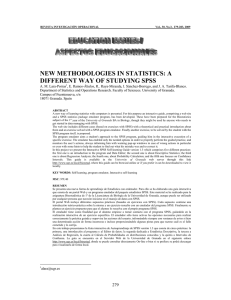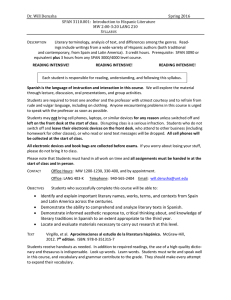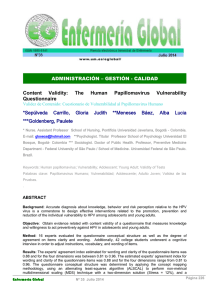índice de sílabus (abet)
Anuncio
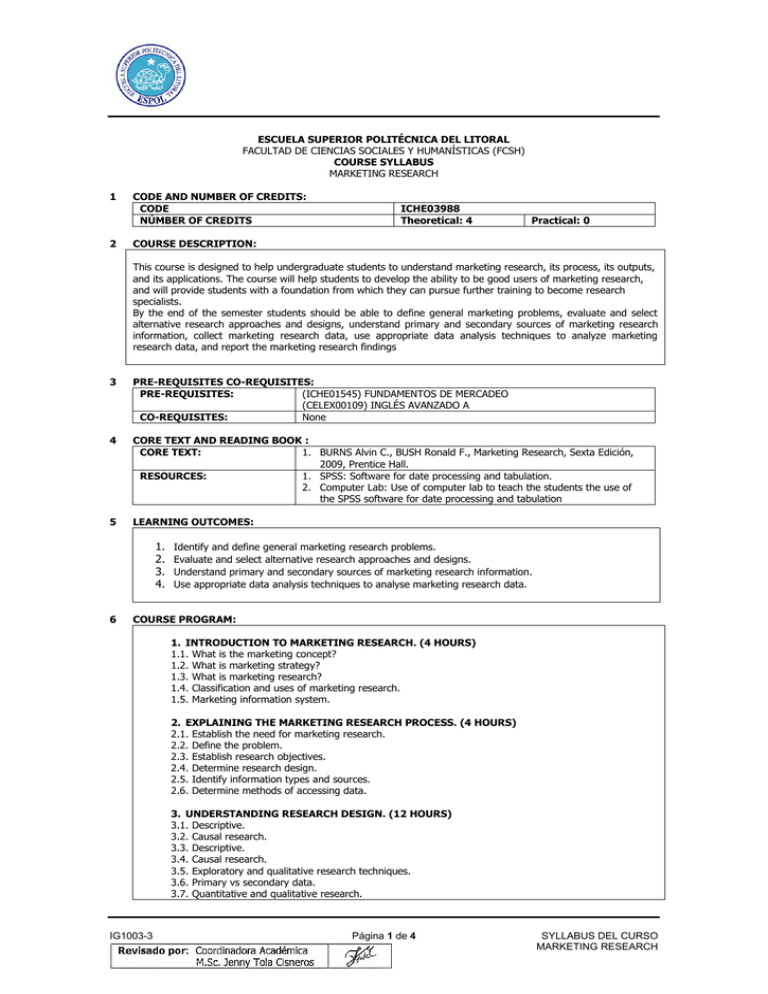
ESCUELA SUPERIOR POLITÉCNICA DEL LITORAL FACULTAD DE CIENCIAS SOCIALES Y HUMANÍSTICAS (FCSH) COURSE SYLLABUS MARKETING RESEARCH 1 2 CODE AND NUMBER OF CREDITS: CODE NÚMBER OF CREDITS ICHE03988 Theoretical: 4 Practical: 0 COURSE DESCRIPTION: This course is designed to help undergraduate students to understand marketing research, its process, its outputs, and its applications. The course will help students to develop the ability to be good users of marketing research, and will provide students with a foundation from which they can pursue further training to become research specialists. By the end of the semester students should be able to define general marketing problems, evaluate and select alternative research approaches and designs, understand primary and secondary sources of marketing research information, collect marketing research data, use appropriate data analysis techniques to analyze marketing research data, and report the marketing research findings 3 PRE-REQUISITES CO-REQUISITES: PRE-REQUISITES: (ICHE01545) FUNDAMENTOS DE MERCADEO (CELEX00109) INGLÉS AVANZADO A CO-REQUISITES: None 4 CORE TEXT AND READING BOOK : CORE TEXT: 1. BURNS Alvin C., BUSH Ronald F., Marketing Research, Sexta Edición, 2009, Prentice Hall. RESOURCES: 1. SPSS: Software for date processing and tabulation. 2. Computer Lab: Use of computer lab to teach the students the use of the SPSS software for date processing and tabulation 5 LEARNING OUTCOMES: 1. 2. 3. 4. 6 Identify and define general marketing research problems. Evaluate and select alternative research approaches and designs. Understand primary and secondary sources of marketing research information. Use appropriate data analysis techniques to analyse marketing research data. COURSE PROGRAM: 1. INTRODUCTION TO MARKETING RESEARCH. (4 HOURS) 1.1. What is the marketing concept? 1.2. What is marketing strategy? 1.3. What is marketing research? 1.4. Classification and uses of marketing research. 1.5. Marketing information system. 2. EXPLAINING THE MARKETING RESEARCH PROCESS. (4 HOURS) 2.1. Establish the need for marketing research. 2.2. Define the problem. 2.3. Establish research objectives. 2.4. Determine research design. 2.5. Identify information types and sources. 2.6. Determine methods of accessing data. 3. UNDERSTANDING RESEARCH DESIGN. (12 HOURS) 3.1. Descriptive. 3.2. Causal research. 3.3. Descriptive. 3.4. Causal research. 3.5. Exploratory and qualitative research techniques. 3.6. Primary vs secondary data. 3.7. Quantitative and qualitative research. IG1003-3 Página 1 de 4 SYLLABUS DEL CURSO MARKETING RESEARCH 3.8. Examples of focus groups, mystery shoppers and blind tests. 3.9. Miniprojects: focus groups, mystery shoppers and blind tests. 4. EVALUATING SURVEY DATA COLLECTION METHODS AND MEASUREMENT. (4 HOURS) 4.1. Definition and advantages of surveys. 4.2. Data collection modes. 4.3. Basic question response format. 4.4. Concept of measurement. 4.5. Levels of measurement scales. 5. DEVELOPING QUESTIONS AND DESIGNING THE QUESTIONNAIRE. (4 HOURS) 5.1. Questionnaire design. 5.2. Functions. 5.3. Questionnaire development. 5.4. Questionnaire organization. 5.5. Question flow. 5.6. Screening. 5.7. Coding. 5.8. Pre-test. 6. DETERMINE HOW TO SELECT THE SAMPLE. (2.5 HOURS) 6.1. Basic concepts in sampling. 6.2. Probabilistic sample methods. 6.3. Non probabilistic sample methods. 7. DETERMINING THE SIZE OF THE SAMPLE. (3.5 HOURS) 7.1. Sample size and accuracy. 7.2. Confidence interval method. 7.3. Central limit theorem. 7.4. Sample size formula. 8. DEALING WITH FIELDWORK AND DATA QUALITY ISSUES. (2 HOURS) 8.1. Non sampling error. 8.2. Field data collection errors. 8.3. Data collection error control. 8.4. Non-response error. 9. USING BASIC DESCRIPTIVE ANALYSIS. (4 HOURS) 9.1. Basic concepts. 9.2. Types of statistical analysis used in marketing research. 9.3. Descriptive measurements. 9.4. Measures of central tendency. 9.5. Measures of variability. 10. USE OF THE SPSS STATISTICAL TOOL. (12 HOURS) 10.1. Data processing; frequencies, cross tabulation, hypothesis test. 10.2. Variance and covariance analysis; Bi-variate correlation and regression. 10.3. SPSS exercises. 11. PROJECT. (4 HOURS) 11.1 Application of the concepts and methods of marketing research. 11.2 Use SPSS statistical package. 11.3 Presentations in class. 7 WORKLOAD: THEORY/PRACTICE: Sessions per week: 2 session Session lenght: 4 hours Weeks per semester: 14 weeks IG1003-3 Página 2 de 4 SYLLABUS DEL CURSO MARKETING RESEARCH 8 CONTRIBUTION OF THE COURSE TO THE EDUCATION OF THE STUDENT: Students will develop an understanding of techniques of planning, conducting, analyzing and presenting market studies, studying different methodologies with emphasis on primary research including questionnaire design as well as demonstrate competency with the SPSS statistical software and the ability to use SPSS to input marketing data analyzing the results from various basic statistical techniques BASIC TRAINING PROFESSIONAL TRAINING SOCIAL SKILLS DEVELOPMENT X 9 THE RELATIONSHIP BETWEEN THE LEARNING OUTCOMES OF THE COURSE AND THE LEARNING OUTCOMES OF THE DEGREE PROGRAM: LEARNING OUTCOMES OF THE DEGREE PROGRAM* a) Have the ability to work as part of a multidisciplinary team; b) Understand the ethical and professional responsibility; c) Have the ability to communicate effectively in Spanish both orally and in writing; d) Have the ability to communicate effectively in English; e) Having a broad education to understand the impact of the solutions of their career in the global, economic, environmental and social context; f) Recognize the need to continue learning throughout life and have the ability and attitude to do it; g) Understand contemporary issues; h) Have the ability to lead and undertake; i) Apply analytical tools to assist in the evaluation and efficient management of financial, human and technological companies in order to expand them internationally; j) Analyze the economic environment and suggest business strategies in the short/long-term to add competitiveness to the company in the domestic and international market; k) Develop and evaluate export and import projects that contribute to the economic development of the company and the country, looking to fulfill corporate social responsibility. IG1003-3 CONTRIBUTION (High, Medium, Low) LEARNING OUTCOMES OF THE COURSE** MEDIUM 4 MEDIUM 3 THE STUDENT MUST: Ability to relate to different types of consumers Responsible management of market research data. LOW MEDIUM 4 Ability to relate to different types of consumers MEDIUM 1 Adapt market research problems with the market situation MEDIUM 2 Explore new ways of market research MEDIUM 1 Knowing contemporary issues to adapt market research to reality 4 Make and suggest tactical and strategic business decisions based on the proper interpretation of marketing research results. LOW LOW HIGH LOW Página 3 de 4 SYLLABUS DEL CURSO MARKETING RESEARCH 10 EVALUATION IN THE COURSE: Evaluation activities Exams Tests Homework/tasks Projects Laboratory/Experiments Class participation Visits Other X X X X X X 11 PERSON RESPONSIBLE FOR THE CREATION OF THE SYLLABUS AND THE DATE OF ITS CREATION: Created by: ECON. HEYDI PAZMIÑO FRANCO Date 16 NOV. 2012 12. APPROVAL: ACADEMIC SECRETARY OF THE ACADEMIC DEPARTMENT NAME: Lcda. Ingrid León Vasconez SIGNATURE: DIRECTOR OF TECHNICAL ACADEMIC SECRETARY NAME: MSc. Marcos Mendoza Vélez. SIGNATURE: Date of approval by the Directive Council: R-CD-FEN- 004-2013 January 14, 2013 13. VALIDITY OF THE SYLLABUS: RESOLUTION OF THE POLYTECHNIC BOARD: 13-10-269 DATE: IG1003-3 October 17, 2013 Página 4 de 4 SYLLABUS DEL CURSO MARKETING RESEARCH
